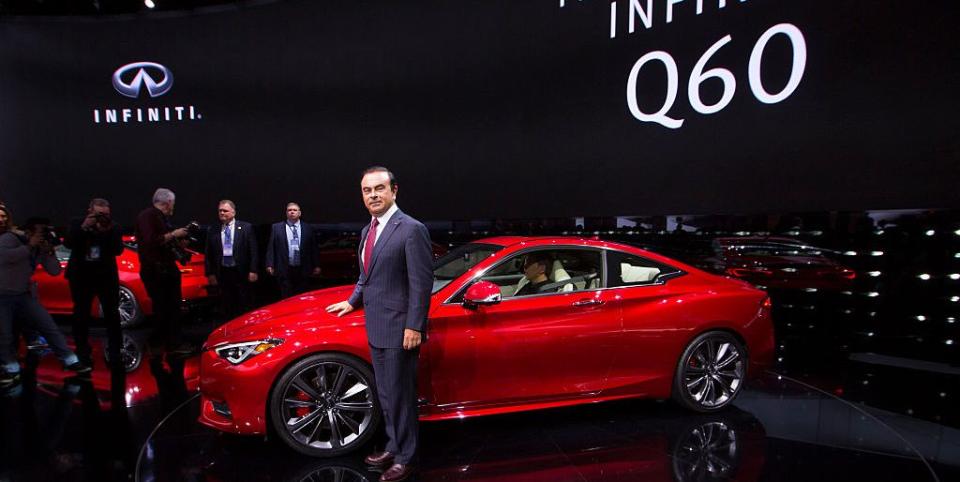Nissan's Carlos Ghosn, Still in Jail, Faces New Financial Wrongdoing Charges

UPDATE 12/27/18: The Reuters news service is reporting that ousted Nissan chairman Carlos Ghosn paid a Saudi Arabian businessman, using what were allegedly Nissan funds, in exchange for helping him wipe away personal losses. Ghosn's representatives reportedly said the payments, which totaled $14.7 million between 2009 and 2012, were made for "legitimate business purposes," although it is entirely unclear what these payments were for or how exactly Ghosn was allegedly involved. Reuters, citing two unnamed company sources, said the Saudi, whom it named as Khaled Al Juffali, had previously arranged a letter of credit for Ghosn to help him out of a financial reverse. Japanese authorities have re-arrested Ghosn; this is his third arrest on financial charges.
UPDATE 12/20/18: Carlos Ghosn was reportedly granted the possibility of posting bail, then saw the offer revoked after less than a day, the Wall Street Journal is reporting. The Tokyo District Court rejected prosecutors' request to extend his detention time, but then new charges were filed claiming he violated Japan corporate law by passing nearly $17 million in losses in 2008 to Nissan from a company he owned personally. These charges, the paper reports, are stopping him from posting bail to leave jail. The ousted Nissan chairman and his associate Greg Kelly were arrested on November 19 on financial misconduct charges and have been held in the Tokyo Detention Center.
UPDATE 12/13/18: The embattled former leader of Renault, Nissan, and Mitsubishi, still in jail in Japan over financial irregularity charges from Nissan, is retaining his status as chairman and CEO at Renault. The French automaker's board of directors met today and made that announcement, stating that it finds Ghosn's compensation reports were "in compliance with applicable law" in France.

Japanese prosecutors have formally charged Renault CEO Carlos Ghosn for making "false disclosures" about his income with Nissan, the automaker said on Monday. Ghosn had been Nissan and Mitsubishi chairman before his arrest in Japan in November. Now, stripped of those titles and three weeks into his detention in a Tokyo prison, he may face a 10-year sentence if convicted.
The alleged crime is that Ghosn violated Japan's Financial Instruments and Exchange Act by omitting tens of millions of dollars of his income from Nissan's public filings. The automaker was swift to condemn Ghosn and came close to admitting its own share of fault as prosecutors charged the company with the same crime.
"Nissan takes this situation extremely seriously," the company said in a statement. "Making false disclosures in annual securities reports greatly harms the integrity of Nissan’s public disclosures in the securities markets, and the company expresses its deepest regret."
Nissan CEO Had Been in Ghosn's Sights for Removal
In an interesting bit of timing, according to unnamed sources speaking to the Wall Street Journal Ghosn had been trying for months to remove Nissan CEO Hiroto Saikawa to "shake up the senior-management ranks" and was set to propose that the board remove Saikawa at a meeting in November. Ghosn was arrested in Tokyo on November 19.
Since then, Ghosn has not been allowed bail, was initially arrested without any charges, and a court extended his prison stay while investigators questioned him. In Japan, such due process for criminal suspects is far different from what would take place under U.S. and European laws. According to the Wall Street Journal, prosecutors will pile more charges on him to "reset the clock," effectively keeping Ghosn in jail for another three weeks and possibly longer unless he confesses to their charges. Nissan may be fined the equivalent of $6.2 million for each year of affected financial statements, and Ghosn and former board director Greg Kelly each face up to 10 years in prison.
At this time, prosecutors have not charged Ghosn with improper use of company assets, such as the Dutch subsidiary that Nissan has alleged he created to buy homes in Brazil and Lebanon. Ghosn, indirectly through reports in Japan's media, maintains that the unreported income was deferred until his retirement and that the amounts were not fixed. What is most perplexing is why Nissan's top accounting executives, knowing exactly how much the company paid Ghosn each year, approved his disclosed pay in securities filings over the past decade and only now have run into trouble.
('You Might Also Like',)

 Yahoo Autos
Yahoo Autos 